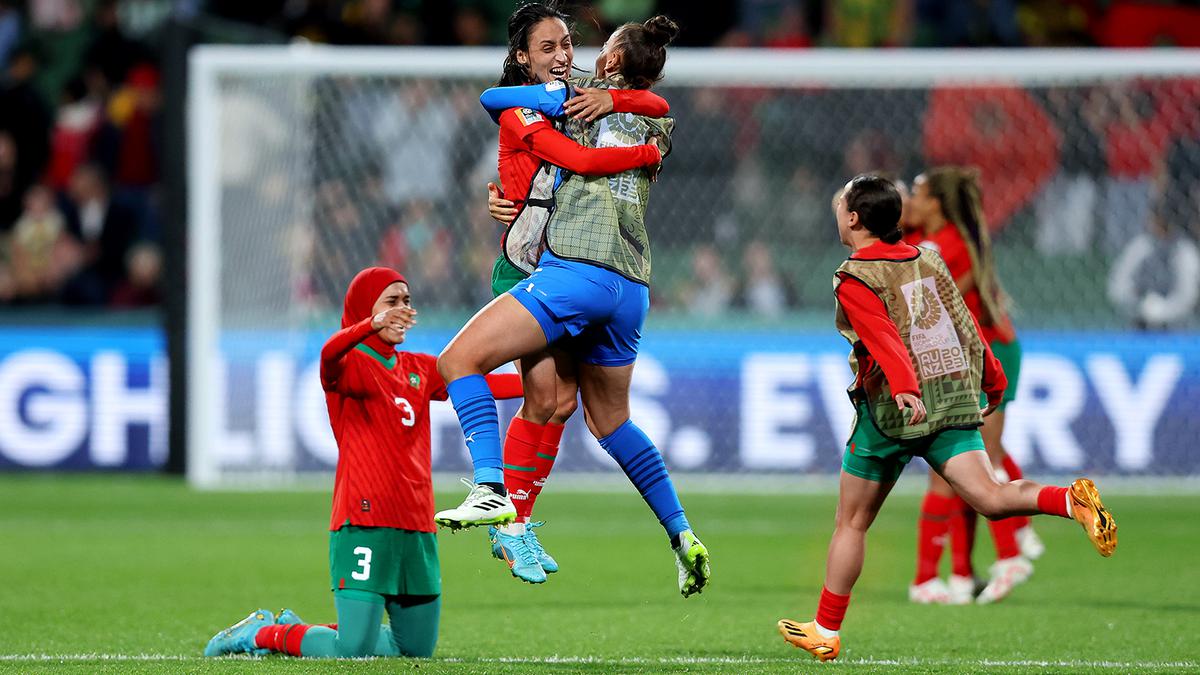
Impossible is not Moroccan — The Arab nation’s fairy tale run could be the start of a new chapter Premium
The Hindu
Morocco's historic run in the Women's World Cup, becoming the first Arab nation to reach the knockout stage, has inspired the continent and Arab world. The Atlas Lionesses and Lions have shown that the impossible is not Moroccan, and the country is now preparing a bid to co-host the 2030 men's World Cup. Women's football in Morocco is far better than in other Arab and African countries, with a two-tier professional league and equal access to facilities. Despite this, there are still disparities and struggles for gender equality in football, with many players not being paid for the qualification stage and lacking medical examinations and facilities. Morocco is leading the way, and hoping its neighbours will follow. #ImpossibleNotMoroccan #DimaMaghrib.
The fairy tale journey Moroccan women’s team was on came to an end on Tuesday when it lost to a dominant France. But the Atlas Lionesses have no reason to drop their heads, as their run to reach the round of 16 in the FIFA women’s World Cup was nothing but historic. Morocco became the first Arab nation to play in the knockout stage and also fielded Noulhaila Benzina, who became the first hijab-wearing player to take part in the game.
The African Arab nation is riding a high tide of football. Less than a year ago, it became the first African, and Arab, nation to reach the semifinal of a FIFA men’s World Cup, where it overcame former champion Spain and fan favourite Portugal on its way, only to be stopped by, coincidentally, France. Now with the women’s team going through the group stage ahead of Germany, which thrashed it 6-0 in their opening game, it is fair to say the Moroccan spring of football has begun.
Both teams found themselves carrying the hopes of the African continent and the Arab world, and both have succeeded in not disappointing them. Moroccan fans did their best to stand with the players who made them proud on the global stage. The hashtag ‘the impossible is not moroccan’, and ‘dima maghrib’, meaning ‘always Morocco’ were trending on social media before the round of 16 clash. Although it resulted in heart break, the Atlas Lionesses and Lions have proved that Morocco can make the impossible happen.
Morocco has been on the global stage of football for quite a long time and has made the occassional ripple. In 1986 the men’s team became the first African nation to go past the group stage in a World Cup, the same feat its women’s counterpart has achieved now. Even though it doesn’t have any major silverware to show, it was for a long time a force to reckon inside Africa and is now widening its reputation.
Morocco is also preparing a bid to co-host the 2030 men’s World Cup with its European neighbours Spain and Portugal. It has previously unsuccessfully attempted to host the prestigious event five times, the most recent of which was thwarted by U.S. Mexico and Canada for the 2026 edition.
The success of Moroccan women can be attributed to their domestic leagues where the situation is far better than the rest of Arab and African countries. Morocco is the only Arab nation with a two-tier professional league for women. The players of Moroccan academies have the same access to all facilities as the men have. Qatar, which hosted the 2022 men’s World Cup is pouring money to develop its men’s team while the women’s team is neglected. The last official match Qatar women played was at the West Asian Football Federation’s Women’s Championship in 2014. There is no mention of the Qatar women’s team on the website of Qatar football association nor is it listed in FIFA rankings.
Jordan made moves to establish its women’s team on the global stage by hosting the 2016 U-17 women’s World Cup and the 2018 AFC women’s Asia Cup, but has since vanished. Saudi Arabia is trying to catch up to Morocco.

 Run 3 Space | Play Space Running Game
Run 3 Space | Play Space Running Game
 Traffic Jam 3D | Online Racing Game
Traffic Jam 3D | Online Racing Game
 Duck Hunt | Play Old Classic Game
Duck Hunt | Play Old Classic Game

















